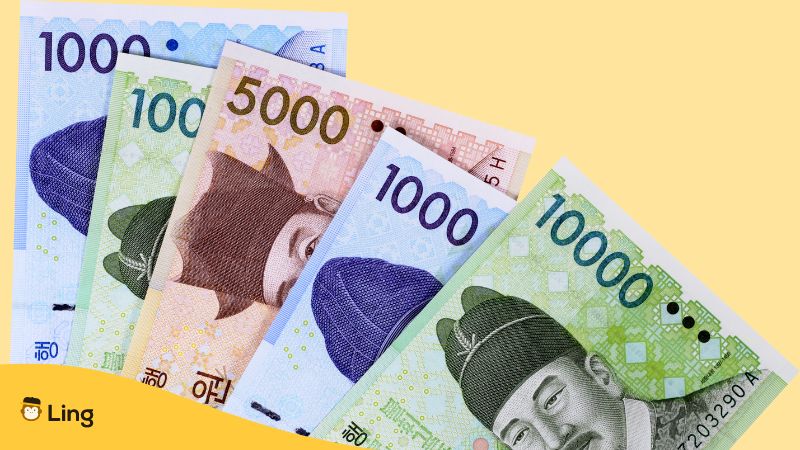Unlock the secrets of managing your finances while embracing the enchanting advent of “Korean words for finances.”
Are you ready to embark on a linguistic journey that fuses the excitement of finance with the charm of the language of South Korea? Imagine being able to discuss budgets, investments, and taxes in a tongue that not only sounds melodious but also empowers you with financial prowess. Get ready as we dive into these linguistic financial assets—where our linguistic minds will gain their road to riches!
Why Should We Know About Finances?
Financial literacy is your ultimate money guide. It’s the key to making savvy financial choices, staying protected from scams, and turning life’s challenges into opportunities. It’s like having a secret weapon for budgeting, investing wisely, and feeling confident in your decisions and specific personal finance. In a nutshell, a basic understanding of finances empowers you to manage money effectively, plan for the future, and navigate life’s financial twists with ease!
Korean Currency

The country’s official currency is the won (KRW), and it’s divided into 100 jeon. While the jeon isn’t used in daily transactions anymore, it does show up in exchange rates. Paper money comes in 1,000; 5,000; 10,000; and 50,000 won bills, while coins strut their stuff in 1, 5, 10, 100, and 500 won (though 1 and 5 won coins aren’t super common). The currency is issued by the Bank of Korea, chilling in Seoul, the capital city. And for today’s currency scoop (as I’m writing this), 1 US dollar gets you around 1,323.98 South Korean won. Keep in mind that its value is continuously changing!
Basic Korean Words For Finances
Understanding Currency
Currency exchange is like the backstage pass to international transactions. Get cozy with terms like “환율” (hwan-yul) for “exchange rate” and “외화” (weh-hwa) for “foreign currency.” Master these, and voila! You’ll glide through currency conversions like a pro!
Income And Expenses
When it comes to your finances, it’s a duo: “수입” (su-ib) stands for “earnings,” while “지출” (ji-chul) covers “expenses.” For example, if you bought something, that is called “지출,” or expenditure. On the other hand, salary or allowance is a form of “수입,” or income.
Savings And Investments
When we talk about “Savings,” in Korean, it’s “저축” (jeo-chuk), and for “Investment,” it’s “투자” (tu-ja). Understanding these terms is pivotal for nurturing your financial portfolio and its growth.
Opening A Bank Account
When you’re ready to open a bank account, you’ll come across the term “계좌” (gye-jwa), which simply means “account.” Also, “예금” (ye-geum) is the word for “deposit.”
ATM Transactions
When it comes to ATM tasks, “인출” (in-chul) is the Korean term for withdrawal, and “잔고” (jan-go) represents your account balance. Knowing these terms equips you to navigate ATM transactions smoothly.
Online Banking
As online banking gains prominence, “인터넷 뱅킹” (in-teo-net baeng-king) becomes the phrase for handling your finances through digital means, in other words, “online banking.” This term encapsulates the world of managing your financial affairs online.

Types Of Loans
Understanding various loan types is vital. In Korean, “대출” (dae-chul) signifies “general loan,” while “신용대출” (sin-yong dae-chul) specifically refers to “credit loan.” This distinction is crucial for navigating the world of borrowing.
Loan Repayment
Mastering loan repayment is essential. In Korean, “상환” (sang-hwan) denotes the act of repayment, and “이자” (i-ja) stands for interest. With these words, you will be able to identify signages, thus repaying debts!
Debt Management
When delving into conversations about debt, it’s important to note that in Korean, “부채” (bu-chae) represents the concept of debt itself, while “관리” (gwan-ri) pertains to its management. Familiarity with these terms enhances your understanding of debt-related discussions.
Stock Market Terms
Venturing into the stock market realm introduces you to key terms. “주식” (ju-sik) translates to stocks, while “주가” (ju-ga) denotes stock price. Knowing these terms is fundamental for navigating the complexities of the world’s financial markets.
Real Estate Vocabulary
For those intrigued by real estate, understanding the terminology is crucial. In Korean, “부동산” (bu-dong-san) refers to real estate, encompassing properties and land. On the other hand, “임대료” (im-dae-ryo) specifically signifies rent, a vital aspect of property transactions.
Investment Strategies
Gaining insight into investment strategies is of utmost importance. In Korean, “투자 전략” (tu-ja jeon-ryak) means “investment strategies,” outlining approaches to financial growth. Moreover, “다각화” (da-gak-hwa) translates to “diversification,” a key concept in spreading risk and enhancing returns.
Business Negotiations
Steering through business discussions demands an understanding of the terminology. In Korean, “상업 협상” (sang-eob hyeob-sang) means the concept of “business negotiations.” Familiarity with this term equips you to navigate the intricacies of commercial interactions.
Economic Indicators
Grasping economic indicators is fundamental for informed decision-making. In Korean, “경제 지표” (gyeong-je ji-pyo) signifies economic indicators, providing insights into a nation’s financial health.
Retirement Planning
Mapping out your retirement path involves understanding the terminology. In Korean, “은퇴 계획” (eun-toe gye-haek) is directly translated as, “retirement planning,” while “연금” (yeon-geum) means “pension.”

As we wrap up our journey through the enchanting realm of Korean financial vocabulary, remember this: learning these terms isn’t just about expanding your linguistic toolkit; it’s about opening doors to a world of financial confidence and empowerment. Each word carries the potential to unlock a deeper understanding of budgets, investments, and money matters.
So, whether you’re sipping on a cup of coffee or embarking on your next business venture, these words will be your companions, guiding you through financial planning and decisions. Embrace the thrill of learning, and let these Korean phrases be your secret sauce to financial success.
Get Serious To Learn With Ling!
Want to get serious about learning Korean? Get ready to conquer languages like a pro, from Korean to 60+ global gems!
Why the Ling app rules the language-learning game:
- 10-Minute Magic: Master languages in a few minutes per day.
- Expertly Crafted: Top-notch lessons by pros.
- All-in-One: Writing, speaking, grammar, and more.
- Track Progress: Watch your fluency bloom.
- Game On: Gamified joy for rapid fluency.
- Languages Galore: 60+ options, including Malayalam, Bosnian, and more!
- Flexibility Rocks: Phone or PC, it’s your call.
- No Boredom: Learning feels like playing.
Unleash the linguist you with the Ling app by downloading it from the Play Store or App Store. Ready, set, conquer!































































